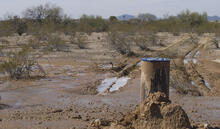
Research

|
Arizona Redistricting: A Perspective on the Process This commentary focuses on the performance of the five-member Arizona Independent Redistricting Commission (AIRC), which has had responsibility for undertaking the task of developing congressional and legislative districts in the state three times — in 2001, 2011 and 2021 — since the voters created it in 2000. |

|
Survey: Statewide Perceptions of Independent Investigations of Officer-Involved Shootings To help policymakers understand statewide perceptions of officer-involved shooting investigations, attitudes toward potential reforms, and support for funding of an independent investigatory agency, a multi-modal survey was conducted of Arizona residents. |

|
The First Forty Years of ASU's Morrison Institute for Public Policy A chronicle of the origins and achievements of ASU's Morrison Institute for Public Policy.
|

|
Are State and Local Policies Addressing Community Concerns about Extreme Heat? Morrison Institute for Public Policy and Guinn Center for Policy Priorities examined what challenges from extreme heat were exposed or exacerbated by the COVID-19 pandemic in Phoenix and Las Vegas. |

|
What drives civically engaged student voters Voting rates among Arizona State University (ASU) students have increased since 2012. Still, young people tend to vote at lower rates than older individuals, and this is especially true in the United States. ASU’s student population is no exception. |

|
2021 Report: Mesa Residents’ Perceptions of the Mesa Police Department and Community Safety To help the Mesa Police Department understand Mesa residents’ current perceptions of policing in the community and attitudes toward potential reforms, a live telephone interview survey was conducted of Mesa residents. |

|
The Myth of Safe-Yield: Pursuing the Goal of Safe-Yield Isn't Saving Our Groundwater Forty years after the passage of the Groundwater Management Act, we are at a crossroads between success and not good enough. |

|
This study examines how housing and in-home supports affect public spending on individuals with chronic mental illness in Maricopa County, Arizona. It does so through a comparative analysis of average costs per person per year across three housing settings: permanent supportive housing, housing with unknown in-home support, and chronic homelessness. |

|
Arizonans are facing a growing problem: low- and middle-income rental housing has become increasingly unaffordable and scarce in one of the nation’s fastest-growing states. Rent increases have far outpaced inflation and wage growth. This surge in rental prices puts low- and middle-income renters at risk, and many Arizona renters have struggled to keep up. |

|
Water is the foundation of public health, economic opportunity, unique natural areas and quality of life in any community. |